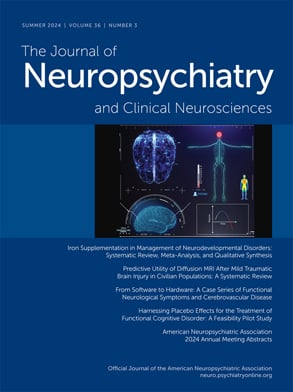To the Editor: Opioids are commonly used substances of abuse; its withdrawal symptoms classically include yawning, sweating, lacrimation, rhinorrhea, anxiety, restlessness, insomnia, dilated pupils, piloerection, chills, tachycardia, hypertension, nausea/vomiting, crampy abdominal pains, diarrhea, and muscle aches and pains. We hereby report another case of delirium during opioid withdrawal.
Case Report
A 23-year-old man presented to the psychiatry outpatient department with a history of sudden-onset violent and agitated behavior, restlessness, not recognizing others, irritability, irrelevant speech, and decreased sleep for the past day. On examination, he was disoriented to time, place, and person, and he was uncooperative for the examination. Detailed history revealed that the patient was using “smack” (a street form of heroin) for the past 4 years. This was corroborated by a friend. There was no history of any other substance use except tobacco. There was no history of alcohol use or any other drugs, as reported by his family members as well as his friend. The patient had been made to remain abstinent forcibly by his family members for the past 3 days, and he was brought to us on the 4th day of abstinence with the above-mentioned complaints. There was no history of any fever, head injury, or any history suggestive of seizures. There was no past history of any psychiatric or neurological illness. A diagnosis of delirium was made. Evaluations, including CBC, liver function tests, serum electrolytes, CT head scan, blood glucose, kidney-function tests, urinalysis, ECG, and chest X-ray, were within normal limits. His personal and family histories were noncontributory. A diagnosis of drug-withdrawal delirium (mental and behavioral disorders due to the use of opioids; acute withdrawal with delirium) was made.
The patient was started on tramadol 200 mg per day, along with clonazepam 3 mg/day. Gradually, he showed improvement in his symptoms of delirium, and his tramadol and clonazepam were tapered over a period of 2 weeks. At this time, the patient reported that he only took smack and had never taken any other substances such as alcohol or benzodiazepines. The patient was subsequently managed with motivational therapy, and naltrexone, at a dose of 50 mg per day, was started. The patient has been maintained well for the past 2 months, with no residual symptoms.
Discussion
Our patient developed delirium after an abrupt discontinuation of heroin. We could not find any other reason for delirium. Moreover, the patient improved when he was restarted on tramadol, and it was gradually withdrawn. Withdrawal is generally reported to be uneventful with opioids. The reports of serious withdrawal symptoms have been very few. We could find only one report of delirium secondary to opioid withdrawal.
1 Recently, report of seizures occurring after opioid withdrawal has been reported.
2,3 Other reports have been related to intoxication delirium or delirium after a single dose of opioid.
4,5 Sudden abstinence from opioids and use of a street variety (mixed with impurities) could be a risk factor for delirium in our patient. Studies with large sample size are required to determine the prevalence of delirium after opioid withdrawal and to identify risk factors for the same. Psychiatrists and physicians should be cautious while evaluating patients with opioid withdrawal. Opioid withdrawal can be complicated and life-threatening, akin to alcohol withdrawal. The potentially life-threatening nature of these complications warrants that patients primarily with opioid dependence be carefully monitored.

